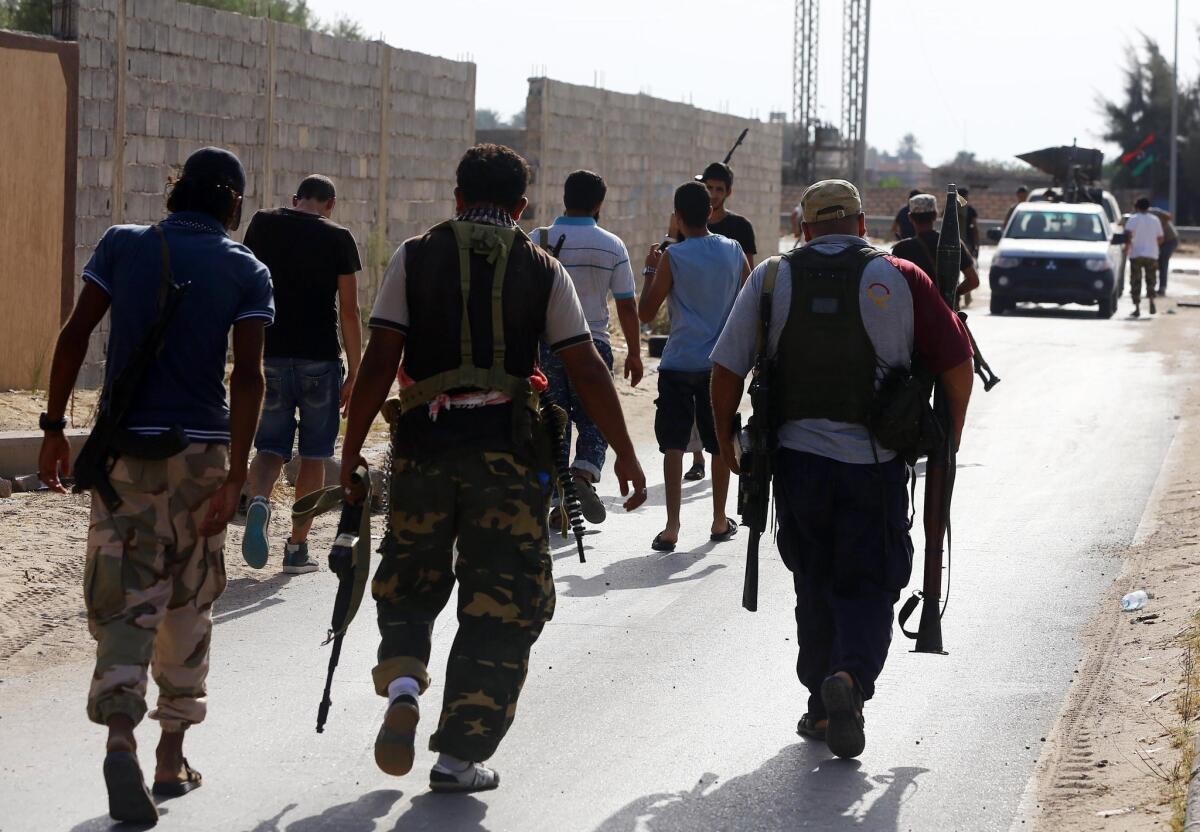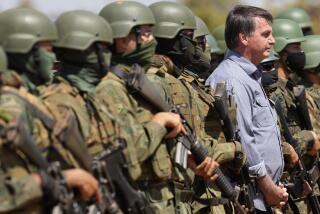Op-Ed: What Libya’s militia problem means for the Middle East, and the U.S.

- Share via
President Obama has lamented not doing more to follow up on the 2011 intervention in Libya.
As the U.S. builds its military campaign against Islamic State, extending airstrikes into Syria, it is not too late for Washington and its allies to heed the lessons from Libya. Even in a post-Islamic State and post-Bashar Assad world, Syria would still have to manage the many other militias battling for control. Not all militias are extremist; nonetheless, their very existence will severely complicate the effort to build any new institutional order.
Just ask the Libyans, whose country is now teetering on the brink of disintegration. When Libya ousted Moammar Kadafi with NATO assistance, it produced a security vacuum that was quickly filled by armed men belonging to a dizzying array of militant factions. These militias have regional, tribal and ideological roots, but they all claim to be “protecting” the revolution and their fellow citizens. In reality, many militias are engaged in predatory and criminal activities, including extortion, smuggling and kidnapping.
The Libyan state’s inability to rein in the militias has led to a vicious cycle. A widespread perception of government helplessness undermines its legitimacy, which in turn compels armed groups to argue that they cannot give up their weapons so long as the government is incapable of providing security. In this spiral of mistrust, the militias are a cause and a consequence of state weakness.
The effects of this dynamic are unlikely to be domestically contained. Egypt and the United Arab Emirates have allegedly backed Khalifa Haftar, the renegade former army general, through airstrikes; Qatar and Sudan have reportedly lent support to the Libyan Dawn coalition of militias, which now controls much of Tripoli, the capital. Militia-fueled post-Kadafi insecurity has been exported, to other nations, including Tunisia, Niger, Chad and Mali.
Militias in Libya offer young men power, prestige and money exceeding anything that the official state can provide. Why would a vendor or a mechanic return to his prewar job if he can make more money and garner more respect as a militia member?
Syria and Iraq will face the same post-conflict dilemmas as Libya. The central issue is how to integrate militias into legitimate state structures and guarantee them a genuine stake in the future of the country. This is difficult in the Middle East because strong and capable security structures have often meant repressive ones.
It will be a particularly difficult task in Syria, where militia configurations are constantly shifting and civil war has hardened fighters. In Iraq, the militias that emerged after the 2003 U.S.-led invasion have remobilized because of the current conflict and the perpetual weakness of the Iraqi army.
For Syria and Iraq, the message from Libya is clear: A comprehensive, long-term strategy for disarming, demobilizing and reintegrating militias is badly needed. In Syria, such a strategy will probably require an international peacekeeping force to ensure law and order, to give the government breathing space and to remove the militias’ primary raison d’etre.
Building politically inclusive governments is also a must. Otherwise, militias can continue to appeal to the grievances of unrepresented sects, minorities, towns and sub-regions.
Finally, there must be concerted focus on institution-building. Throngs of revolutionaries filling squares tend to capture the attention of media and analysts, eclipsing the important and often unglamorous work of building the bureaucratic institutions critical to reining in militias and ensuring stability, while legitimizing democracy — and the state.
Terrorist threats and the rise of militia politics are intricately linked in the Middle East’s three rapidly collapsing states. The U.S. will not be able to eradicate terrorist groups and the threat they pose without a clear and resolute policy for dealing with militias.
Mieczyslaw P. Boduszynski, who formerly served as a U.S. diplomat in Libya, is assistant professor of politics and international relations at Pomona College in Claremont. Kristin Fabbe, an assistant professor of government at Claremont McKenna College, is also a research fellow at the Institute of Regional and International Studies at the American University of Iraq, Sulaimani.
Follow the Opinion section on Twitter @latimesopinion
More to Read
A cure for the common opinion
Get thought-provoking perspectives with our weekly newsletter.
You may occasionally receive promotional content from the Los Angeles Times.









